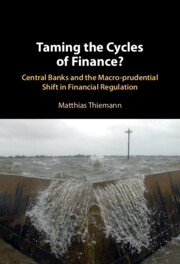Book contents
- Taming the Cycles of Finance?
- Taming the Cycles of Finance?
- Copyright page
- Contents
- Figures
- Tables
- Prologue
- Acknowledgments
- 1 Introduction
- 2 The Changing Regulation of Finance after the Crisis
- 3 The Evolution of Systemic Risk Thinking Pre-crisis
- 4 The Selective Rise of Macro-prudential Ideas in the Wake of the Crisis
- 5 Is Resilience Enough?
- 6 From the Global to the Local
- 7 Taming Liquidity and Leverage in the Shadow Banking Sector
- 8 Into the Upswing
- 9 The Crisis That Wasn’t
- 10 Conclusion
- Appendix: List of Interviews Conducted
- References
- Index
10 - Conclusion
The Asymmetric Application of Financial Stability Concerns
Published online by Cambridge University Press: 15 February 2024
- Taming the Cycles of Finance?
- Taming the Cycles of Finance?
- Copyright page
- Contents
- Figures
- Tables
- Prologue
- Acknowledgments
- 1 Introduction
- 2 The Changing Regulation of Finance after the Crisis
- 3 The Evolution of Systemic Risk Thinking Pre-crisis
- 4 The Selective Rise of Macro-prudential Ideas in the Wake of the Crisis
- 5 Is Resilience Enough?
- 6 From the Global to the Local
- 7 Taming Liquidity and Leverage in the Shadow Banking Sector
- 8 Into the Upswing
- 9 The Crisis That Wasn’t
- 10 Conclusion
- Appendix: List of Interviews Conducted
- References
- Index
Summary
As a result of the work of applied economists within central banks, economic knowledge about financial instability grew impressively after the crisis. Yet this new knowledge is applied in an asymmetric manner. Whereas it has become the foundation for the quick intervention to contain financial instability as it unfolds, requiring little to no additional evidence to become effective, the very same knowledge faces substantial hurdles when it seeks to intervene in financial markets in a precautionary manner, making such ad hoc interventions necessary in the first place. This asymmetry reveals the paradox of evidence-based macro-prudential regulation. Whereas conclusive evidence beyond any doubt is necessary to intervene and constrain financial actors in the upswing, such evidence becomes unnecessary when procyclical amplifications of financial stress threaten to undo the entire web of the interconnected financial system. Herein resides, I argue, the tragedy of the macro-prudential reform efforts, which, while producing knowledge about the dangers and mechanisms of financial instability, are incapable of mustering the political will to engage in preventive action.
- Type
- Chapter
- Information
- Taming the Cycles of Finance?Central Banks and the Macro-prudential Shift in Financial Regulation, pp. 250 - 264Publisher: Cambridge University PressPrint publication year: 2024



